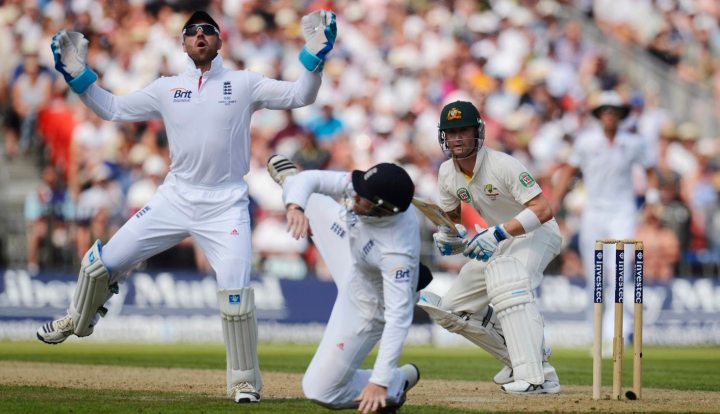Sport
The Ashes: Five talking points after day one at Old Trafford

In a dramatic twist, Australia has actually competed with England in the Ashes. Australia showed its batting isn’t quite as limp as many have made it out to be, and umpiring once again fell under the spotlight. ANTOINETTE MULLER picks five talking points from day one at Old Trafford.
Something strange happened in Manchester on Thursday. Australia won the toss, chose to bat and didn’t completely embarrass itself. The visitors made two changes to their side, swapping Ashton Agar and Phil Hughes for Nathan Lyon and David Warner respectively.
Australia passed 300 for the first time in seven innings, and only for the third time this year, as Michael Clarke and Steve Smith combined for an unbeaten 174-run partnership. Australia ended the first day on 303-3 in the sweltering heat. Equally hot were the debates around umpiring and everything else that happened on the field. We’ve picked five of the main talking points from day one of the third Ashes Test.
DRS and umpires
Another day, another umpiring controversy. The powers that be might as well remove the sponsor’s name from the series and call it the DRS Ashes. The culprit this time was the third umpire. Usman Khawaja was given out caught-behind and he reviewed the decision almost immediately. Upon referral to the third umpire, there was no blotch on Hot Spot and the keeper’s view showed a wide gap between bat and ball. There was some sort of sound, but it could very well have been the bat hitting the pad. The third umpire, many believed, had enough evidence to overrule the on-field decision. He didn’t. Khawaja was given his marching orders and, as has become expected in this series, debate raged on. That there is merit in the Decision Review System, there is no doubt. If used correctly, it can serve to eliminate really poor decisions. The problem isn’t always with the system, it’s with those who operate it. Even without the review system, the Khawaja decision would have been a poor one. The ICC need to make sure umpires know exactly how to the use the system and that they are up to date with all the tech they have available. If the system is still failing after that, then perhaps it’s time to employ specialist technology umpires. In its current state, the protocols are often flawed.
Why is Australia still persisting with Watson?
Shane Watson looked somewhat more circumspect on day one at Old Trafford, but he was still far too impatient. Watson had started to build a decent innings, but wafted at a ball wider off stump. He has now been dismissed for below 20 over 31 times in his career and hasn’t scored a half century in 11 innings. At the start of the series, all stats were in Watson’s favour against England, but he’s fallen flat on his face trying to capitalise on those. Watson needs to go back to first class school. Find him an English county and post him off for a few lessons.
Did England miss a trick not playing a second spinner?
There was some talk that England would stun the world by being progressive enough to include a second spinner in its attack. England’s batting hasn’t been a major worry and cutting somebody like Jonny Bairstow for an extra spinner would seem logical. The Old Trafford deck has been turning quite a bit and it’s only day one. They won’t have the luxury of bowling last on the deck, but they might have benefited more from the extra spinner instead of relying on the part-time innocuous tweaking of Joe Root.
Has Michael Clarke finally broken his number four shackles?
Michael Clarke scored the first century by an Australian in six Tests. He scored the last one, too, in Chennai. It was also his first century at number four. It wasn’t the most aesthetic innings, but it was technically sublime. Clarke left anything remotely on a good length and didn’t try to play across the line. Not quite the thundering 300s he was racking up at one stage, his innings was still a fine effort and a lesson in how much you can achieve by keeping things simple.
Is England psychologically strong enough to deal with adversity?
England has been pretty dominant since its series against South Africa last year. Barring a blip in New Zealand, the team was all over India and comprehensively dealt with the Black Caps on the return tour. They’re now under the cosh. Just like with the two last-wicket partnerships at Trent Bridge, England is being challenged and it shows in their energy levels. When teams are used to being so in control all the time, their egos do tend to swell. There is nothing wrong with that. But what does one do when that ego takes a knock? Professional sportsmen are training to deal with the bumps that come with being put in place, but England hasn’t had to deal with that for so long, the players might have forgotten. Once they had used up all their reviews, their appeals became subdued and much fewer. Once Jimmy Anderson was brutally denied a wicket he was so convinced he had that he didn’t even celebrate, things changed a bit. England has hit an unfamiliar slump.
Day one, close of play summary
Australia 303-3
Michael Clarke 125* (208), Steve Smith 70* (150); Tim Bresnan 20-5-51-1, Graeme Swann 25-2-85-2 DM
Photo: Australia’s captain Michael Clarke (R) watches as England’s Matt Prior (L) and Ian Bell try in vain to catch a ball during the third Ashes test cricket match at Old Trafford cricket ground in Manchester August 1, 2013. REUTERS/Philip Brown


















 Become an Insider
Become an Insider